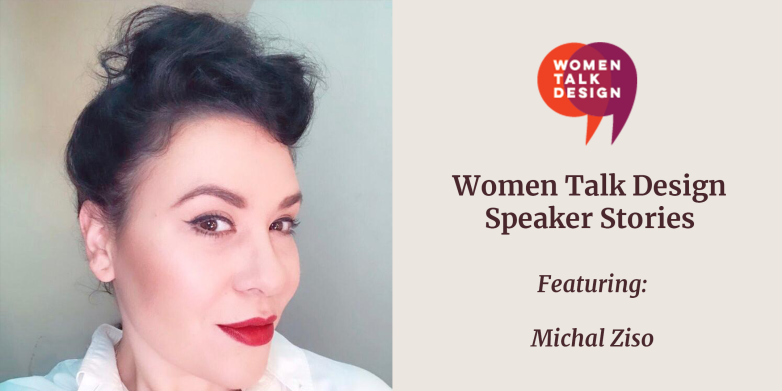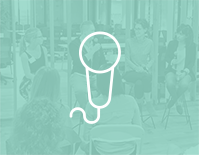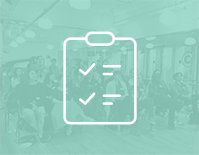Michal Ziso on speaking as an opportunity to learn and connect
As part of our #WTDSpeakerStories, we spoke with Michal Ziso about her journey as a public speaker, how she started on a big stage, the impact it’s had on her career, and her advice for new speakers.
In our Women Talk Design Speaker Stories series, we’re interviewing a Women Talk Design speaker every week about their journeys and experiences. We talk to speakers who are just getting started, speakers who have had their fair share of speaking mishaps, speakers writing books, and speakers curating events. At the end, we offer an opportunity for folks from the WTD community to ask their own questions and connect with each other. Visit our events page for more information about the series and RSVP for our next event.

Michal Ziso is an Architect, Space Architect, an Advisory Board Member of Moon2Mars VC and the Founder & CEO of ZISO, an architecture + innovation lab that imagines, designs and creates the future of the built environment. Being a Space Architect, Michal researches and designs living environments for humans outside of planet earth, focusing on human centered & inclusive design using the extreme environments in space as a creative tool for innovation. ZISO lab offers research, design and consultation as well as creative direction and mentoring, while thriving on interdisciplinary collaboration.
A two time TEDx speaker (TEDxISU International Space University, Strasbourg, France + TEDxJaffaWomen, Tel Aviv, Israel), Michal commands the global stage as a frequent keynote and public speaker at academic institutions (Parsons School of Design NYC, ISU, Technion and more) organizations (NASA, ISA, Ramon Foundation, UNOOSA, and more) and tech companies (Wix, Jolt, Kenshoo and more). Keynote speaker topics focus on designing desirable futures on earth through space architecture, fostering innovative mindsets, finding your competitive edge, impact economy, diversity & inclusion perspectives and making unbiased decisions.
On why she speaks and she started
Michal shared how her first talk threw onto the big stage, which is what truly set her on a path to speaking.
“I never planned on [speaking]. My story’s a bit unique because the very, very first time I was on stage in my life was in front of 1,600 people doing my very first TEDx talk. I dove in, right to the big stage. And it was very, very scary for me but I felt that I had a special message that I wanted to share.”
“I was really scared. As I was preparing my talk, I’m thinking, “What should I share? What should I talk about?” The reason that I even got there was because I was living and working in New York, designing skyscrapers, and I was always the only woman in the room. And I had a lot of interesting stories but I wasn’t even sure that it’s okay to talk about it like that. I did in my talk because I felt that it was worth sharing – maybe we’ll help someone, maybe someone will be able to relate – it kind of snowballed from there.”
When talking about how she ended up speaking at a TEDx event for her very first talk on stage, Michal highlighted the importance of just applying.
“A lot of people ask me, “How do you get a TED talk? How do you do it?” And I answer, “You apply.” That’s the first thing you should do. That’s what I did – I applied and I never even thought in a million years that I was going to get accepted. And a few months later, I got a call. I don’t know if it was luck or if my story really resonated or both. But that was my first time so I really encourage people that want to speak in these kinds of events to apply. Don’t wait for someone else to reach out to you because a lot of us don’t know the right people at the very, very beginning.”
“After I got accepted, they told me that my video was not good. But they said that they thought there’s something there and that they were interested in my topic. So the topic and the content got them, not the video.”
Since her first speaking engagement, Michal said her thoughts around speaking have evolved but her core message remains.
“I always say that my life is divided between before that event and after. Leading up to it, I just talked about my experience. I talked about my life. There are very unique opportunities or events that happened to me and from being the only woman in the room and the only woman on the construction site in New York. The developers and the investors were always men and it was very odd. I decided I want to focus on the connection between architecture and equality. What is the implication of it? If everything around us is designed by men, it has to have an impact on us in our experience.”
“After that, when I became a more seasoned speaker, I was able to understand the core of my message and to wrap it up with [a] connection depending on the audience that I’m going to speak to – it can be more architectural oriented or more equality oriented or more space-oriented or more innovation and career entrepreneurship oriented. But the core stays the same. I was able to build different talks that I can pull from depending on the event that I’m invited to.”
On how she chooses speaking engagements and develops talks
Michal talked about how she thinks about speaking engagements and the way that the selection process can change depending on your experience with speaking.
“In the beginning, you want to get exposure. The main factor is big events, big organizations. You’re willing to do things pro bono. I was invited to do another TED Talk in the International Space University and the Ted organization is not allowed to pay the speakers. Of course, I said yes, because it’s a big exposure. And in the beginning, I actually looked for those big, big events, because it’s a very big platform and big exposure.”
“I’m always happy to do events that are targeting young women to get into STEM and STEAM professions. That’s something that’s always very, very interesting to me and close to my heart. And I also love to go to speak at creative tech companies. Usually, we talk about innovation, we talk about creative thinking, and sometimes we do workshops, sometimes we do hackathons.”
She talked about how her process for developing talks and preparing to speak has also evolved as she’s become more experienced.
“The shorter the presentation, the harder the work. So for my TED Talk, which was about 12 minutes, I prepared for three months. I wrote everything down, I memorized everything, I knew every sentence, every word, every intonation, every gesture of my body. It was really like dancing on stage. I wrote for about two months and then the last month was only practice – rehearsing 10 times a day until it kind of flew from me.”
“Now I’m rarely writing my talks down. I just write the outline. One of my topics is storytelling. So I always make sure that I have a certain curve or a certain way of creating my talk. In the beginning, I can just present who I am – What’s the situation? What’s happening? What’s the problem? Then it’s building the story to a climax and giving some more information as we go down, using the same type of frame for all of my talks – the shorter ones and the longer ones. I really do try to talk about it without memorizing anything because it makes me more at ease as I’m speaking.”
“Today, I have at least one or two speaking engagements a week. Usually, it’s one pro bono and one paid. I adjust the presentations to the audience that I’m going to speak to but since I did so many different types of groups, it’s pretty easy for me to just have to adjust [an existing talk].”
Michal also talked about her considerations when choosing events to attend as an audience member and how they factor into her process for creating valuable talks.
“When I choose the conferences that I go to as an audience, I usually choose conferences that interest the people that I’m interested in. Not topics that I want to listen to but topics that my investors will want to listen to, or developers will want to listen to.”
“Something that I tried to do also with my talks is to give value that [the audience] will not be able to find online. Because if I’m able to find your content online word for word, I’ll feel as though I’m wasting my time to actually get dressed, leave the house, and go somewhere. So I always look for that value to get from speakers and always make sure that I give that value to my audience as well.”
On handling nerves and using mishaps as opportunities
Michal highlighted some of the ways that, as a new speaker, she prepared to get on stage in front of 1,600 people.
“That very, very first time [on stage,] I didn’t know how my body would react. I didn’t know if my voice would disappear, I didn’t know if my knees would lock. I didn’t know what what’s gonna happen because I had never been on stage before. So what I did was I went out on the street and stood on a bench and started talking – like in Hyde Park in London or a lot of places you see in LA on the boardwalk – and I just talked like a crazy person in front of people. And those people on the street were not people that wanted to hear me. You always have to remember that people that come to hear you speak, they’re there for you. But the people on the streets were not there for me so that was even harder. [I thought] if I can manage that, it would help me with the nerves on stage.”
“What I did before my [first[ talk was I went around the crowd. Nobody knew who I was so I just felt the energy. And it charged me up. And then when I got on stage, I realized that I love being on stage. And the bigger the crowd, the more comfortable I feel.”
She also talked about times when something has gone wrong on stage and how preparing ahead of time helped.
“[At one talk], I only had 12 minutes to talk but in the first three minutes, there were big explosions from the mic that everyone could hear. And I was talking but I kept looking backstage with the corner of my eye, waiting for them to stop me or to tell me to start over because it was so bad. But because I rehearsed so much, the words just came out of my mouth and I was able to think and speak about two different things at the same time.”
“It was very, very bad. Rehearsing really helps for those moments so you’re able to continue without paying attention to it. I wouldn’t suggest stopping in these types of situations unless it’s very noticeable and you’re allowed to. Things like that happen and the more you practice, the more you have experience, the less you get stressed out about it.”
“And maybe you’ll also be able to have more room to improvise and to just talk. It’s a good opportunity to talk to the audience. A lot of times, it’s very interesting to know what people are thinking as you’re speaking. This is a good opportunity to just ask, ‘How’s it going? What do you think is interesting for you? What was the one thing that caught your attention?’ Use these types of opportunities to really engage and ask questions that you don’t normally get to ask your audience. And it’s very informal, so it’s comfortable for everyone.”
On how speaking has impacted her career
Michal talked about speaking as a huge opportunity both as a source of income itself and as a bolster to her career in general.
“I never planned on being a public speaker as a substantial part of my career. But once I started, I realized that that’s a very good way to network. That’s a very good way to let people know what you do, let people know what you’re up to. It is also a very good way to get your message across if you want to change the world and help people.”
“A lot of things come out of these types of events and speaking opportunities. Now I take advantage of it. I really love doing it. You’re able to reach many people and to really leverage it – for surveys, for your work, for research. And you have an opportunity to speak to a lot of people so it’s always important to know who you’re speaking to, (1) to create your presentation but, (2) to know who did you speak to, what were their ages and demographics to get feedback from them afterwards. It’s an integrated part of my work.”
She has discussed how she has made speaking part of her career and income and gave some advice for getting paid as a speaker.
“Speaking can get you good income. What I realized is that because I’m doing something that is very, very niche – there aren’t many space architects in the world – and I have to really educate the market and explain to them that they need me as an architect professional, I don’t get a lot of projects. Most of my space projects are research projects – I didn’t build in space just yet. But I learned from speaking that if I invest my time to build a presentation, it’s an asset that I have that I can then go on and sell. And you can reach a point where you can do three, four big keynotes a month – that means you’re actually working four days a month for money – and the rest of the month you have for yourself to build your business or to build whatever you want to build without the burden of getting paid. That can really sustain you if you want to build a company or create something or write a blog or write a book.”
“Usually I ask, ‘What is your budget?’ Not, ‘Do you have a budget?’ Then if they don’t have a budget, it’s on them to explain why I should do it for free. It’s not on me to say that I should get paid. It should be obvious that the speaker should get paid – that’s your job, you’re there to do work.”
“The next step is to give them a few options. Even if they ask me for a 60 minute talk with 15 minutes for q&a, I always give a 45 minute talk or 30 minute talk price, a price for 60 minutes, and a price for a 90 minute workshop. I put what they asked me for in the middle so they will feel that they have the option to take something cheaper and if they don’t want to pay as much, they know that they’ll get a shorter talk. But they are also not paying the higher price of something longer than what they actually want. That’s a behavioral psychology trick to make them feel that they chose how much they are going to pay me instead of me making them pay at a certain price.”
On her advice for new speakers
Michal ended our chat with three pieces of advice for new speakers – be the expert, think of yourself as a vessel for the content, and allow yourself to say you don’t know.
“When you’re speaking, you are the master. You are the person with the knowledge. Nobody else knows what you are going to say. So (1) they will not know if you mess up – only you will know that, and (2) you really have to be comfortable with what you’re saying. Once you get to that position, you have to own it. You should own it and enjoy it because really, everyone is there to hear you.”
“Something that my mentor told me is to think about yourself as a vessel for your content to the people, your audience. It’s not about you as a person. It’s about what you’re saying and it’s for them. So the better you do, the better you’re serving your audience. That puts yourself as a person, as an individual outside of that equation and it feels more like a calling and something that you do for them instead of to them.”
“A lot of people are scared of interruptions and questions and if someone will ask something that they don’t know how to answer. It’s really okay to say, ‘Amazing question – I have to check and I’ll get back to you. Please connect with me on LinkedIn or something.’ Then it makes people understand that they can connect with you – that’s an opportunity. It’s okay to say that you don’t know. You don’t always have to have all the answers.”
For more on what she’s doing next, how she approaches workshops, and her tips for presenting virtually, watch the full video below.

